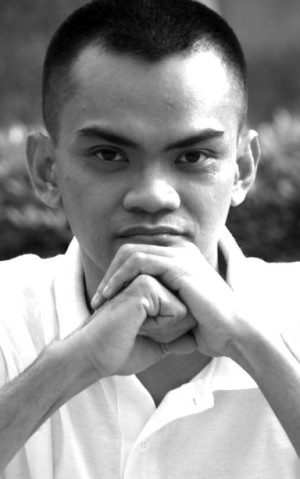
PAREDES
We went against the grain last Friday morning, as we drove to meet the Translacion motorcade, which was bringing the statues of the Sto. Niño and the Virgin of Guadalupe to Mactan. The traffic on our lane was put on a standstill for a few minutes as the motorcade passed by.
Crowds on both sides of the streets excitedly waived, sang, and danced to the image of the Holy Child and that of his mother, the Virgin Mary.
We, on the other hand, were on our way to witness the final return of one of Cebu’s prodigal sons, an artist who fled the city when he was a teenager shortly before the Second World War.
We were heading to the crematorium of the Sacred Heart Parish, where the ashes of Manuel Rodriguez, Sr., the Cebuano artist who died at the age of 105 in Florida last year, was about to be honored once again by his family, friends, fellow artists, and fine arts students here in Cebu before he would finally be laid to rest in a local cemetery, one of his final wishes. Some members of his family who are now based in the United States came to bring his ashes.
It was an intimate memorial Mass celebrated by Fr. Jason Dy, S.J., an artist-priest who used to curate the church’s Alternative Contemporary Art Space, an old garage turned into a gallery, during his short stint in Sacred Heart Parish before leaving Cebu for London to take his Master of Fine Arts.
Cebuano artists who came to pay homage to Mang Maning (as he was fondly called by most of his artist-friends) was happy to meet Fr. Jason as well. He has contributed a lot in promoting Cebuano artists and in uniting them for common endeavors.
In his homily, Fr. Jason cited Mang Maning’s contributions to Philippine modern art, particularly in reintroducing printmaking to the public as an art equal in status to painting or sculpture.
In his desire to make art accessible to the public, Mang Maning intitiated printmaking workshops, exhibits, and organized fellow printmakers into what later would become the Printmakers Association of the Philippines, one of the biggest and longest-running art organizations in the country.
His passion to reach as many people as possible through his art brought him to Europe and the United States.
He would spend the longest time in New York City, which would later honor him with declaration of the Manuel Rodriguez, Sr. Day, a special day which was to be annually celebrated by the city. Given by the incumbent mayor of New York City just before Mang Maning died last year, this was in recognition of the Cebuano artist’s contributions to the promotion of art in the Big Apple.
Although, he had not spent much time here in Cebu, Mang Maning’s success inspired many Cebuano artists. In our recent conversation, Jose “Kimsoy” Yap, another Cebuano artist who had spent some 20 years in New York during the 70s and the 80s, recalled how he often visited Mang Maning and his artist son, Manny, who is Kimsoy’s friend, in their studio.
Kimsoy himself would become a successful artist in New York, although he excelled more in figure and landscape painting rendered in the academic style. Like Mang Maning, Kimsoy himself, a multi-awarded artist, is now considered one of the Cebuano masters.
Another Cebuano artist who has been deeply inspired by Mang Maning is Celso Pepito. In the last few years, Celso has been frequenting America, particularly New York and Florida to exhibit his work there and to hang out with friends, among them the family of Mang Maning.
It was Celso who helped Mang Maning’s family organize the memorial mass for Mang Maning in Cebu. In Manila, the Cebuano master who is considered the “Father of Modern Printmaking in the Philippines” was also honored by fellow artists, particularly members of the Printmakers Association of the Philippines, who held a tribute to him at the Cultural Center of the Philippines.
For his efforts to promote modern art at the time when most artists held on to tradition, and for his passion to make art accessible to the ordinary Filipino, through the “democratic art” of printmaking, went against the grain of the Philippine art scene during the postwar years.
He did all these away from his hometown, which he had left as a teenager.
But it wasn’t all for naught, as the artist actually brought pride to Cebu by being an example of what an ordinary Cebuano could become, in his case an artist of international stature.
Like the Holy Child’s Translacion last Friday, Mang Maning took his own journey home for the Sinulog, this time for his final rest.